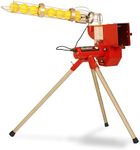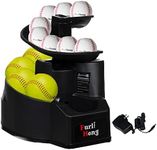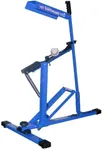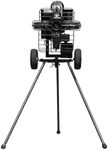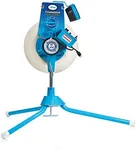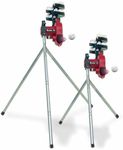Buying Guide for the Best Softball Pitching Machines
Choosing the right softball pitching machine can significantly enhance your training and improve your game. When selecting a pitching machine, it's important to consider various factors that align with your training needs, skill level, and the specific features that will help you get the most out of your practice sessions. Here are some key specifications to consider and how to navigate them to find the best fit for you.Pitch SpeedPitch speed refers to how fast the machine can throw the ball. This is important because different skill levels require different speeds to practice effectively. Machines typically offer a range of speeds, from slower pitches for beginners to faster pitches for advanced players. If you are a beginner, look for a machine with adjustable speeds starting from lower ranges (e.g., 30-50 mph). Intermediate players might need speeds ranging from 50-70 mph, while advanced players should look for machines that can pitch at speeds of 70 mph or higher. Choose a machine that matches your current skill level and allows room for growth.
Pitch TypesPitch types refer to the variety of pitches the machine can throw, such as fastballs, curveballs, sliders, and changeups. This is important for developing a well-rounded skill set and preparing for different game scenarios. Some machines can only throw fastballs, which might be sufficient for beginners focusing on basic hitting skills. More advanced machines can simulate multiple pitch types, which is beneficial for intermediate and advanced players who need to practice hitting different kinds of pitches. Consider your training goals and choose a machine that offers the pitch variety you need.
Power SourceThe power source of a pitching machine can be either electric or battery-operated. This is important for determining where and how you can use the machine. Electric machines need to be plugged into an outlet, which means they are best suited for use in locations with easy access to power. Battery-operated machines offer more portability and can be used in various locations, including fields without power outlets. If you plan to use the machine in a fixed location, an electric model might be more convenient. For those who need flexibility and portability, a battery-operated machine is the better choice.
Ball CompatibilityBall compatibility refers to the types of balls the machine can pitch, such as regulation softballs, dimpled practice balls, or even baseballs. This is important because using the right type of ball can affect the quality of your practice. Some machines are versatile and can handle multiple ball types, while others are designed for specific balls. If you want to practice with regulation softballs, ensure the machine is compatible with them. For general practice, dimpled balls are often used because they are durable and provide consistent performance. Choose a machine that fits the type of balls you plan to use.
AdjustabilityAdjustability refers to the machine's ability to change pitch height, angle, and speed. This is important for simulating different pitching scenarios and tailoring practice to specific needs. Machines with high adjustability allow you to practice hitting pitches at various heights and angles, which is crucial for developing a comprehensive hitting technique. Beginners might not need as much adjustability, but intermediate and advanced players will benefit from machines that offer a wide range of adjustments. Consider how much versatility you need in your training and choose a machine that provides the necessary adjustability.
DurabilityDurability refers to how well the machine can withstand regular use and exposure to the elements. This is important because a durable machine will last longer and provide consistent performance over time. Machines made from high-quality materials like steel or heavy-duty plastic are generally more durable. If you plan to use the machine frequently or in outdoor settings, look for one that is built to handle wear and tear. Consider the construction and materials of the machine to ensure it meets your durability needs.



